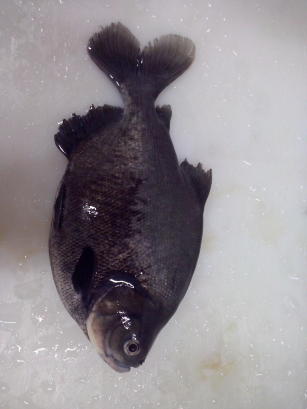Propaga: aquaculture production systems for the propagation of young forms of tambaqui, pirarucu and Amazonian shrimp in the Southeast Territory of Amapá
Propaga: aquaculture production systems for the propagation of young forms of tambaqui, pirarucu and Amazonian shrimp in the Southeast Territory of Amapá

Photo: YOSHIOKA, Eliane Tie Oba
Project that aims to generate and disseminate technical information through strategic technology transfer actions for producers and technicians of technical assistance and rural extension (ATER), aiming to strengthen and make the production chain of fish and shrimp culture self-sufficient in the production of young forms of tambaqui, pirarucu and Amazonian shrimp, in the state of Amapá.
This project also aims to implement Technical Reference Units (URT) for the reproductive management of pirarucu, tambaqui and Amazonian shrimp; technological adaptation and validation, generating sustainability indicators for intensive breeding of these species; and training of producers, ATER technicians and undergraduate and graduate students in techniques for propagating these forms of aquaculture production systems.
This study gained strength due to the scenario of fry offerings versus the 20% growth of fish farming in Amapá, in which approximately 95% of the fry used in aquaculture enterprises come from other states. In view of these factors, and the potential of aquaculture in the region, this study aims to contribute to the development of fish farming in the state of Amapá, in view of the fry production / rearing of the target species, where losses are considerable, reaching up to 70 % of mortality, considering that part of this high mortality happens due to the lack of technique in the cultivation, to the inadequate transport and reception of commercialization of the species.
This action is part of the Integrated Project of the Amazon (PIA), financed by the Amazon Fund and operated by the National Bank for Economic and Social Development (BNDES), in cooperation with the Ministry of the Environment.
This project also aims to implement Technical Reference Units (URT) for the reproductive management of pirarucu, tambaqui and Amazonian shrimp; technological adaptation and validation, generating sustainability indicators for intensive breeding of these species; and training of producers, ATER technicians and undergraduate and graduate students in techniques for propagating these forms of aquaculture production systems.
This study gained strength due to the scenario of fry offerings versus the 20% growth of fish farming in Amapá, in which approximately 95% of the fry used in aquaculture enterprises come from other states. In view of these factors, and the potential of aquaculture in the region, this study aims to contribute to the development of fish farming in the state of Amapá, in view of the fry production / rearing of the target species, where losses are considerable, reaching up to 70 % of mortality, considering that part of this high mortality happens due to the lack of technique in the cultivation, to the inadequate transport and reception of commercialization of the species.
This action is part of the Integrated Project of the Amazon (PIA), financed by the Amazon Fund and operated by the National Bank for Economic and Social Development (BNDES), in cooperation with the Ministry of the Environment.
